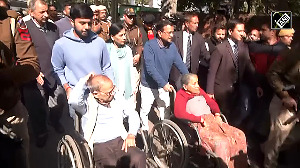It's an unlikely setting for a luxury hotel. Surrounded by chawls and mill-chimneys, the exposed brick colonial facades of ITC Grand Central loom over the overcrowded landscape.
On the face it there may be nothing unusual about the 242-room property that has replaced what was a defunct cigarette factory in central Mumbai. However, the opening of the Central is a sign of how the heart of Mumbai is changing.
"We foresaw the transformation of the area and are focusing on the need for a hotel to service the business traveller. It also gives us the first-mover advantage in this market," says Sarabjit Dhawan, vice president - west, ITC Welcomgroup.
Over the last five years, hotels, offices and recreation hubs have shifted from the south to the north of the island city.
"There was a desperate need to decongest the central business district so areas like Andheri-Kurla and Bandra-Kurla saw tremendous activity," says Kekoo Colah, executive director of Mumbai-based realty firm Knight Frank.
The shift of companies and space constraints in the south saw 12 hotels come up in proximity of the financial capital's domestic and international airports as well as the newly established suburban business districts. ITC's new property signals the emergence of a new market in Mumbai.
"We've traditionally divided the market into the north and the south. Now the central part will be a separate market altogether," says Charles Bennet, senior consultant with hospitality consultants Mahajan & Aibara.
As a result, privately owned mill land has been transformed into swank, glass-facade office buildings, retail and high-rise contemporary living spaces.
In due course, the 25 mills owned by the state-owned National Textile Corporation are expected to undergo a similar makeover.
Developers are now eyeing the release of 73 acres of land (about 55 football fields) from just five of the total NTC-owned mills. Once this happens, real estate analysts expect to see a reverse shift from the north back to central Mumbai.
ITC's move then comes as no surprise. "There is no other hotel in this vicinity. For people who have business in the offices in the area, there will no longer be any need to travel to the south or north," agrees Dhawan. That may change in the future. Another hotel -- a 250-room Four Seasons is on the anvil.
But will ITC's property take away business from the north and south hotels?
Says Rajiv Kaul, vice president, Mumbai Hotels, Taj Hotels, Resorts and Palaces, "It's a development to watch with interest, not fear, because the central district opening up is good news."
Agrees John Toomey, director of marketing- India, Marriott International, "It won't change the Mumbai hotel market. Location is still the key; people who need to be in the south will choose between properties there, and similarly in the north. This is another option for people to avoid commuting between the two extremes."
Dhawan is also banking on food and beverage revenue from its five restaurants.
All Mumbai hotels have seen robust business in the last year and ITC's new property only adds 200-odd rooms to existing supply. While there may be some scepticism about its pricing given the location (rooms start at an introductory price of Rs 6,000 plus taxes), most analysts say ITC has definitely made a smart move.






 © 2025
© 2025